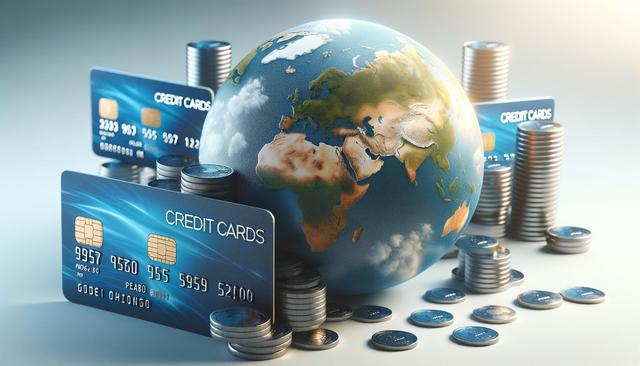What is a Credit Card and How Does it Work?
A credit card is a payment card issued by financial institutions that allows users to borrow funds up to a pre-approved limit to make purchases or withdraw cash. When you use a credit card, you’re essentially taking out a short-term loan that must be repaid, usually with interest if not paid off in full by the due date. The card issuer pays the merchant on your behalf, and you, in turn, are obligated to repay the issuer.
Credit cards differ from debit cards in that they are not connected directly to your bank account. This means you can spend beyond what you have in your checking account, but it also means you need to manage your spending carefully to avoid accumulating debt. Most credit cards come with a monthly billing cycle, and you receive a statement outlining your purchases, minimum payment due, and the total outstanding balance.
Key components of how credit cards work include:
- Credit limit: The maximum amount you can borrow on the card
- Annual Percentage Rate (APR): The interest rate charged on outstanding balances
- Grace period: Time during which no interest is charged if the balance is paid in full
- Rewards or cash back: Some cards offer incentives for spending
Understanding these elements is crucial for using credit cards responsibly and avoiding unnecessary fees or interest charges.
Types of Credit Cards Available
Credit cards come in various types, each designed to meet specific financial needs or spending behaviors. Choosing the right type depends on your credit history, spending habits, and financial goals. Some of the most common types include:
- Standard credit cards: Basic cards with no rewards or special features, often easier to qualify for
- Rewards credit cards: Offer points, miles, or cash back on purchases
- Secured credit cards: Require a security deposit and are typically used to build or rebuild credit
- Balance transfer cards: Allow you to transfer high-interest debt from another card, often with a low introductory rate
- Business credit cards: Tailored for small business needs, offering expense tracking and business-specific rewards
Each type has its pros and cons. For example, rewards cards can be valuable if you pay off your balance each month, but they might have higher interest rates. Secured cards are a good option for those with limited or poor credit history, helping them demonstrate responsible usage over time.
Benefits of Using Credit Cards Responsibly
When used wisely, credit cards offer a range of benefits that go beyond just convenience. Responsible credit card use can improve your financial health and even help you save money in the long run.
Key benefits include:
- Building credit history: Timely payments and low utilization ratios contribute positively to your credit score
- Purchase protection: Many cards offer protection against fraud, damaged goods, or unauthorized charges
- Travel perks: Some cards provide travel insurance, airport lounge access, or no foreign transaction fees
- Emergency funding: In situations where immediate funds are needed, a credit card can be a useful tool
Additionally, credit cards often come with tools to help you manage your spending, such as mobile apps, budget trackers, and alerts. These features can help you stay on top of your finances and avoid overspending.
Common Pitfalls to Avoid
While credit cards offer many advantages, misusing them can lead to financial difficulties. It’s important to recognize the common mistakes that can cause debt to spiral out of control.
Some of the most frequent pitfalls include:
- Only making minimum payments: This results in high interest charges and slow debt repayment
- Carrying a balance: Accumulating unpaid balances increases your debt and affects your credit score
- Late payments: These can lead to fees, higher APRs, and negative marks on your credit report
- Maxing out your card: High credit utilization negatively impacts your creditworthiness
To avoid these issues, it’s essential to create a budget, monitor your spending, and pay your balance in full whenever possible. Set up automatic payments or calendar reminders to ensure you never miss a due date.
How to Choose and Manage a Credit Card
Selecting the right credit card involves evaluating your financial situation and comparing available options. Consider factors such as interest rates, fees, rewards programs, and eligibility requirements. It’s also wise to read the terms and conditions thoroughly before applying.
When managing a credit card, keep the following practices in mind:
- Track your expenses to avoid overspending
- Review statements monthly for errors or unauthorized transactions
- Stay below 30% of your credit limit to maintain a good credit utilization ratio
- Use rewards strategically, but don’t overspend just to earn points
It’s also helpful to periodically review your credit report to ensure accuracy and check your credit score. This proactive approach can help you spot potential issues early and maintain a strong financial profile.
Conclusion: Using Credit Cards to Your Advantage
Credit cards can be powerful financial tools when used wisely and with discipline. They offer convenience, security, and the opportunity to build a solid credit history. However, they also come with risks that require careful management. By understanding how credit cards work, choosing the right type, and avoiding common mistakes, you can make informed decisions that support your financial goals. Whether you’re a student, a working professional, or someone rebuilding credit, the key is to stay informed and in control of your spending habits.




Leave a Reply